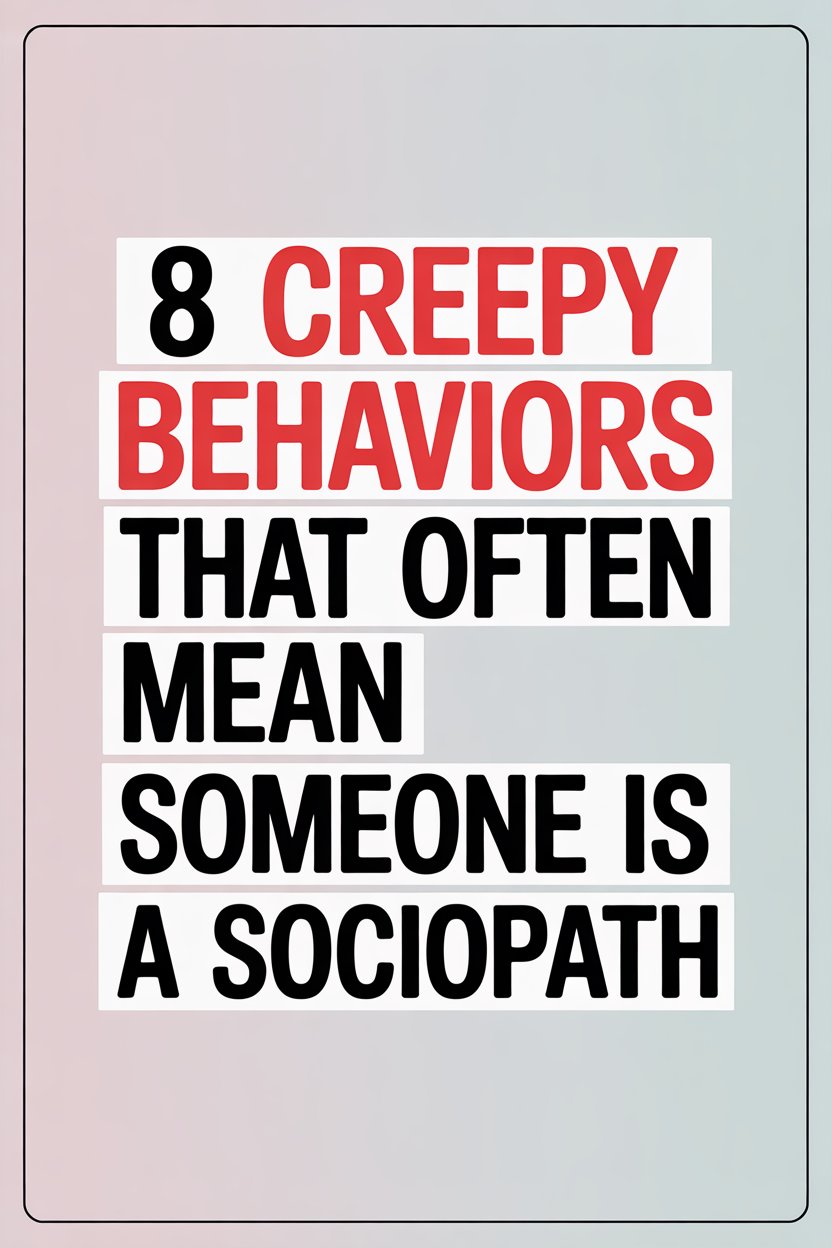Ever met someone who made your skin crawl, even though you couldn’t put your finger on why? Maybe they seemed charming on the surface, but something just wasn’t right.
Welcome to the unsettling world of sociopathic behaviors—where red flags aren’t just waving, they’re doing the Macarena right in front of you.
Here’s your crash course in the eight creepiest behaviors that often point toward sociopathy.
Spoiler: If any of these sound like your last date, it might be time to “lose” their number.
1. Pathological Lying That Makes Politicians Look Honest
Some folks fib here and there (who really flosses every single night?), but sociopaths elevate lying to an Olympic sport. Their relationship with the truth is purely casual.
What makes it especially chilling? They don’t just tell little white lies; they spin elaborate, unnecessary tales with the confidence of a five-year-old who’s “definitely not” the one who broke the vase.
They’ll change stories mid-sentence, contradict themselves, then stare at you like you’re the one who’s confused.
If you catch them out, don’t expect sheepish apologies. Instead, you’ll get indignation—maybe even blame for “misunderstanding” them. It’s manipulation with a sprinkling of gaslighting, and it’s their bread and butter.
2. Zero Empathy, Like a Robot Pretending to Be Human
Ever try sharing your feelings with someone and they respond like you just told them about a weather forecast? Sociopaths don’t genuinely experience empathy.
They can fake concern (Oscar-worthy, at times), but scratch the surface and it’s all tumbleweeds.
This lack of emotional resonance isn’t just awkward at funerals. You may notice callousness when others are in pain, or a baffling inability to grasp why their actions hurt people.
When confronted, they might even seem irritated by all the “drama” around them.
If you’re looking for a shoulder to cry on, theirs is made of cardboard.
3. Charm That Feels Like a Used-Car Sales Pitch
Sociopaths are skilled in the art of superficial charm. We’re not talking endearing awkwardness—they’re smooth, polished, and their compliments feel a little too tailored.
You’ll often notice they make fast friends wherever they go, only for those relationships to mysteriously implode later.
The charm serves a purpose: winning trust, lowering defences, and getting what they want. It’s all very “smile now, knife later.” If you get the sense you’re being wooed with the enthusiasm of someone chasing a five-star Uber rating, trust that feeling.
4. Constantly Breaking Rules (and Not in a Fun Way)
A little harmless rebellion is practically a rite of passage. But sociopaths see rules as mere suggestions… or maybe polite requests to ignore. Laws, social norms, even basic decency—they’re all optional.
You might catch them cheating, stealing, or bending any agreement if it suits them. It doesn’t matter how small the rule or how big the risk; the thrill is often part of the appeal.
When confronted, they’re more likely to laugh it off or blame you for being “uptight.”
If you find yourself regularly excusing their antics (“Oh, that’s just how they are!”), there’s a good chance you’re not dealing with a lovable scamp, but someone with a much darker playbook.
5. Shallow Relationships That All Seem to End in Flames
Notice a trail of scorched-earth friendships, exes who seem traumatized, or family drama that would put soap operas to shame? Sociopaths don’t do intimacy; they do conquest.
Relationships are transactional. Once you’re no longer useful (or interesting), you’ll get dropped faster than a knockoff phone.
When pressed about past connections, expect vague answers—or blame placed squarely on those “crazy” people who just couldn’t handle them.
If getting close to someone feels like signing up for emotional whiplash, it’s time to reconsider whether this “connection” is worth the chaos.
6. Blame Shifting and Zero Accountability
When sociopaths mess up, you won’t hear “my bad.” Mistakes are always someone else’s fault: you, their boss, society, Mercury in retrograde—pick your scapegoat.
This isn’t just garden-variety defensiveness; it’s an Olympic-level refusal to own up. They might even twist things so you feel guilty for their actions. (“If you hadn’t made me angry, I wouldn’t have said those things!”)
Constantly feeling like the villain in someone else’s narrative? Start questioning why you’re always cast in the role of scapegoat.
7. Predatory Manipulation That Would Make a Cat Proud
Sociopaths can be master manipulators. Not just run-of-the-mill guilt trips, but calculated moves to control people and situations—sometimes without you even noticing at first.
They might isolate you from friends, mess with your sense of reality (hello, gaslighting!), or guilt you into doing things you’re not comfortable with. They’re experts at spotting vulnerabilities and using them to their advantage.
If your boundaries feel like a suggestion box, or you’re always dancing to someone else’s tune, it’s time to ask: Who’s pulling the strings here?
8. Complete Lack of Remorse—They Sleep Like Babies
We all mess up and (hopefully) feel bad about it. Sociopaths? Not so much. Remorse, guilt, shame—these are just words in a dictionary they’ve never opened.
They might apologize, but it’s usually because they want to avoid consequences, not because they actually feel bad. You’ll notice a pattern of hurting people, getting caught, then acting as if nothing happened.
If you push for accountability, they may even double down, acting baffled that you “can’t let things go.”
If someone seems unfazed by the emotional carnage they leave behind, take note. That’s not resilience—it’s a warning sign.
When the Red Flags Come Out to Play
No one wants to believe someone close to them is a sociopath. Yet, when these behaviors start stacking up like a Jenga tower from hell, it’s time to take them seriously—especially if your gut is screaming louder than your morning alarm.
Trust your instincts. That creepy feeling you get isn’t paranoia—it’s self-preservation.
Sociopaths are experts at making you question your reality, but your discomfort is the best early warning system you have.
If you’re seeing more than one of these behaviors in someone you care about, don’t brush it off. Talk to a therapist, confide in friends, and—if needed—make your exit. No relationship is worth sacrificing your sanity.
And if you happen to be reading this because you’re worried about yourself… well, therapy is never a bad idea. Unless you’re just hoping to pick up some new tricks, in which case—don’t.
Relationships should leave you feeling safe, valued, and maybe only a little bit exasperated (that’s just love). Creepy doesn’t have to be part of the package.


